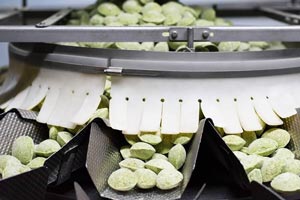While turnover for the Villeneuve d’Ascq, France-headquartered Bonduelle Group declined by 1% to €1,406.6 million during the first half of the 2018-19 financial year, sales in the frozen vegetable sector were positive in Europe.
After a difficult start in the fiscal year, the frozen and canned food operating segments in Region Europe posted strong, solid growth in the second quarter. In contrast, the fresh products operating segment saw subdued growth in Q2, which was partly contributed to fallout from anti-government demonstrations in France. Fresh produce benefited from favorable weather conditions in the first three months of the fiscal year.
Region Europe, accounting for 45.7% of total sales, grew +1.4% in the first six months in terms of reported figures and +1.6% on a comparable basis. The second quarter showed accelerated growth, with + 2.2% improvement in reported numbers and + 2.4% on a like-for-like basis.
Sales outside Europe, which account for 54.3% of total turnover, decreased by -2.9% in terms of reported figures and by -3.1% on a comparable basis in Q2, and 3.0% and -3.6%, respectively, during the first six months.
In North America, settlement of some sales contracts with frozen and canned food producers was delayed in the first quarter and postponed to the second quarter, as expected.
In addition to acquiring new customers and launching a Bonduelle salad bowl range in Canada at the end of the half year, activities in the fresh products segment in North America faced challenges, namely: the targeted cessation of unprofitable product ranges at Bonduelle Fresh Americas (cut fruit, packaged salads); a warning from health authorities in the US and Canada about eating certain kinds of salads that affected all industry stakeholders that Bonduelle or its suppliers did not participate in; and the sourcing diversification strategy of one American client.
In the second quarter, Russia confirmed strong sales momentum of the Bonduelle brand in the frozen and canned foods segments realized during the previous six-month period. In particular, some innovations in corn, olives and mixed vegetables in jars, which are meanwhile produced in Russia, contributed to this.





